- Home
- David Pilling
Flame of the West Page 3
Flame of the West Read online
Page 3
We cheered the unexpected arrival of our general, but he was in no mood for ceremony. Lathered in dust and sweat, he wore a plain grey robe over his armour, and the flanks of his shuddering horse were slick with blood. He had a hundred Veterans at his back, hand-picked from his personal guard.
“How many men have you brought?” he snapped at John without exchanging greetings, his voice taut with anxiety.
John was used to more courteous treatment, and blinked before replying. “Ah…five thousand, sir,” he managed, “three thousand foot, and two thousand horse. I led the cavalry myself in a forced march across Campania after landing at Otranto…”
Belisarius wasn’t interested. “Five thousand!” he yelled, throwing up his hands, “God and the Saints, that is nowhere near enough! Why has the Emperor forsaken me? Have I not served him to the best of my ability? I gave him North Africa, I conquered Sicily without losing a single man, I have defended Rome against the worst that the barbarians can throw at me, and still he denies me the reinforcements I ask for!”
An embarrassed silence fell over the gathering of officers. Belisarius was beside himself, drawn and haggard and thinner than ever, his armour hanging awkwardly off his bony, meatless frame. What he said was almost, if not quite, treason, and there were many listening who might easily twist his words for their own ends.
He must have been desperate to take such an appalling risk, quitting the safety of Rome and riding through the Gothic lines with just a handful of guards. Perhaps he did so in the certain belief that Justinian had despatched a mighty army to save Rome. Grief and disappointment were etched on his face.
Antonina broke the silence. “My lord husband,” she said, “the Emperor must have sent every man he could find. There are rumours of plague in some of our provinces, and the imperial treasury is well-nigh exhausted.”
He gave her an evil look, narrowing his eyes when he spotted Theodosius, but said nothing. The general’s regard for his wife was well-known – indeed, it degraded him in the eyes of many – and even in his rage he would not rebuke or contradict her in public.
“King Vitiges has sent three ambassadors to Rome, asking for a truce,” he said, calming a little, “I have granted it. For the present, hostilities have ceased. Hence I was able to ride here tonight.”
He turned to John. “I came to urge you to bring your supplies into the city with all speed, while the truce lasts. It must be done now. Tonight. The Goths cannot be trusted, and may betray us at any moment.”
John spread his hands. “Now, sir? But our oxen are exhausted, and in any case the only road available to us is narrow and in poor repair. Our wagons cannot travel along it safely at any great speed.”
“You have a fleet, man,” Belisarius said impatiently, “use boats to transport the supplies.”
“But they would have to be towed upriver, sir,” replied John, “the only road that follows the stream is on the northern bank, in the hands of the enemy.”
I should have known better than to intervene, but wanted to impress Belisarius, and remind him of my presence.
“We could use our sails,” I said, stepping forward, “and turn to oars when the wind drops.”
John regarded me with disdain. “The Goths will be patrolling the northern bank. Regardless of the truce, do you think they will simply let us sail along the Tiber into Rome? Our crews would have to negotiate a hail of arrows.”
An idea struck me. “Then protect the rowers with shields and wooden mantlets. The Goths have no vessels of their own, and can do nothing but shoot at us.”
The ghost of a smile appeared on Belisarius’ ravaged features. “I should make you a general,” he said, pointing at me, “perhaps I will yet.”
“I made the Briton a centenar, sir,” said John, giving me an evil look, “a temporary command, of course.”
Belisarius nodded. “I confirm the appointment,” he said, “with all my heart. If only all my officers were so dependable as Coel, and so loyal.”
He called for a remount, and changed horses while I gently swelled with pride. I had never craved officer rank, particularly, but it was something to be rewarded for my efforts, and to know I still basked in the general’s favour.
I glanced sidelong at Antonina, wondering at her thoughts. Her soft grey eyes briefly rested on me, and then flickered away, their secrets veiled. Theodosius, I noticed, had taken a step back from her divan, and studiously avoided looking at her. That young man, I thought, would soon have to cause to regret stepping into the viper’s bed.
Belisarius rode back to Rome, leaving his officers to arrange the transport of the convoy. John wasted no time in rousing the men, ignoring their grumbling and swearing, and ordered them to load the smallest of our boats with provisions.
I was told to oversee the construction of wooden mantlets to protect the rowers.
“It was your idea, general,” John snarled at me, “and can be your responsibility. If none of our vessels make it to Rome, I will make sure part of the blame falls on your shoulders.”
Once again I had succeeded in alienating an important man. Procopius might have remarked again on my talent for making enemies among the rich and powerful, but he had returned to Rome with Belisarius.
The river was narrow and winding, and there was no wind. Our boats rowed through the darkness in single file. John placed me in the first boat, doubtless in the hope that a Gothic arrow would find its way into my gullet.
I stood beside the steersman, shivering in the chill night air and straining my eyes to look for signs of movement on the northern bank.
“They cannot fail to spot us,” I muttered. Our vessels were lit by lanterns hanging from the mast-heads, to guard against losing their way in the dark.
The object was not stealth, for there was no way of hiding our progress from the Goths, but speed. Rome had been starving when I left, the citizens forced to eat grass (and each other, if the rumours of what went on in the poorest districts were to be believed) and it was vital our supplies got through without delay.
Occasionally I glimpsed a light on the northern bank, and the dim shapes of horsemen. The Goths were tracking us, but no arrows came flying over the water. The truce was holding.
I learned later how desperate King Vitiges was for a peaceful settlement. Despite being vastly outnumbered, Belisarius had re-conquered much of Italy and defeated all efforts to prise him out of Rome. The Goths were also suffering from famine, for Belisarius sent out frequent raiding parties to disrupt their supply convoys.
With an artfulness that surprised me, he also spread false rumours of the size of the Roman reinforcements about to land in Italy. Had Vitiges known how pitifully few and overstretched the empire’s resources were, he might not have been so eager to come to terms.
Even while our boats were rowing up the Tiber, the Gothic ambassadors were striving to persuade Belisarius to abandon the struggle for Italy and accept a compromise. Procopius was present at the negotiations, and told me what passed between the Gothic spokesman and Belisarius.
“My sovereign,” said the former, “is guided by the virtues of moderation and forbearance, and sincerely wishes to bring an end to the mutual miseries of this war.”
He went on to describe the justice of the Gothic cause, and their legal right to possess the kingdom of Italy, citing dubious precedents from history. Belisarius scornfully denied them all, and then the Goth made this startling offer:
“Though convinced that even our enemies must inwardly feel the truth of the arguments we have urged, yet we are willing to prove our peaceful intentions, by granting you Sicily, that fertile and extensive island, so convenient, by its position, for the maintenance of Africa.”
Belisarius laughed at this – he rarely had cause to laugh – and I like to think he had me in mind when he made his reply.
“Your generosity in yielding a province which you have already lost requires an adequate response. I will resign to the Goths the island of Britain, an island much large
r than Sicily, and once part of the Empire. May you profit from her!”
The spokesman retreated, red-faced, to hammer out a new set of proposals with his colleagues. Back and forth the negotiations went, and they were still arguing when our fleet arrived safely in Rome.
Our progress down the Tiber had been swift and sure, and entirely without incident. Belisarius was overjoyed at the arrival of fresh supplies of corn and wine, and ordered the dormant mills and bake-houses to set to work again. He was careful to ensure there was enough bread for all, and sent soldiers into the streets to dole out rations to the starving populace.
He summoned me into his presence, at his house near the Pincian Gate, and confirmed my appointment as centenar.
“You have distinguished yourself,” he said, clapping me on the shoulder, “as I trusted you would. Coel the Briton, one-time champion of the racetrack, who fought loyally for the Empire and brought the supplies safely into Rome. Soon your fame will eclipse that of your grandfather.”
I was surprised he remembered Arthur, whose name was but a faint echo in this part of the world.
“Some of our mercenaries from Germania tell tales of him,” he explained, “though they seem to have got him confused with their own heroes. They recite sorts of tales of Arthur hunting a gigantic boar, fighting giants and riding monstrous fish to explore the depths of the ocean. Amusing nonsense, but I am interested in the truth behind it all. He was a great captain of horse, is that not so?”
I nodded enthusiastically. “Yes, sir. His Legion were the greatest horse-soldiers who ever lived. They smashed Britain’s enemies in twelve great battles, and held the land safe, without Rome’s aid, for over twenty years.”
“But Arthur was betrayed and killed in the end, yes? Leaving Britain without a protector.”
“That is correct, sir,” I replied sadly, “my mother and I fled the country in the aftermath of Camlann, where Arthur’s Legion was destroyed. I know nothing of the current state of Britain, whether it has been conquered by barbarian tribes, or split into dozens of warring kingdoms.”
Belisarius looked at me for a long moment. He was an expert at concealing his thoughts, and I could only wonder what he had in store for me. With the fate of Italy rested on his creaking shoulders, he must have had good reason to prolong an interview with a nobody like myself.
“Britain has stood alone for too long,” he said at last, “it is time all the lost satellites of Rome were brought back into her orbit. We have taken back North Africa, and shall keep Italy, no matter what the Goths throw at us. If we can reconquer Italy, then why not Gaul, or even Britain?”
I stared at him, striving to read his expression. Was he serious? It was impossible. Belisarius had achieved extraordinary things, but to take back the whole of the Western Empire was a dream even Constantine the Great had not entertained. The Empire barely had enough soldiers to defend its own shrunken borders, and the expeditions to North Africa and Italy had been an astonishing gamble. Thanks to good fortune and the skill of Belisarius, the dice had landed in our favour.
And yet…we had watered the soil of Italy with the blood of thousands of Goths, and our own losses were trifling. If all the barbarian nations of the West came against Belisarius, united in arms, I would have given him an even chance of victory.
“Trust in me, Coel,” he said with an encouraging smile, “there is no limit to what can be achieved. God has granted us one victory after another. Your homeland may yet be saved.”
He said no more, and I left his presence in a daze, striving to make sense of this unexpected glimpse into the general’s secret character.
I had never credited him with any ambition beyond carrying out the orders of his master in Constantinople. He might have made himself King of Africa after defeating the Vandals, but declined the opportunity and hurried home to assure Justinian of his loyalty.
Your homeland may yet be saved. These words replayed, over and over again, in my mind that night. I could not sleep, and in the small hours of the morning cursed Belisarius for his vagaries. What had he meant? He was not a man to waste words, or honey them with lies.
Or so I thought.
5.
Belisarius was soon active again. He sent John the Sanguinary away from Rome, despatching him north-east with two thousand cavalry to the town of Alba Fucens, beside the shores of the Fucine Lake.
John was instructed to observe the truce and refrain from the slightest act of aggression. If the Goths broke the treaty, he was to ride out without delay and overrun the province of Picenum, a region of Italy between the Appenines and the Adriatic Sea. In this way Belisarius anticipated the renewal of war, and planned in advance while continuing to negotiate with the Goths.
I was happy to see John go, and to enjoy an interval of peace in Rome. The city was still surrounded by a vast horde of Goths, but the morale of our garrison was high, and even the citizens – usually a miserable, cowardly, treacherous set - were buoyed by the recent influx of supplies.
“Give a man enough bread and wine,” Procopius remarked, “a woman in his bed, and a chance to score off his enemies, and you won’t hear much complaining from him.”
We had resumed our walks through the city whenever I was off-duty. He delighted in pointing out antiquities and filling my head with the long, complex and bloody history of Rome. I was happy to listen. Procopius had a passion for teaching and history, and it was easier to succumb to it than resist.
“There,” he said, indicating a familiar sight, “the sepulchre of Hadrian. You know it quite well, I believe.”
I did indeed. It had been the scene of some of the fiercest fighting for Rome, when the Goths had launched an all-out assault on the walls and chosen the sepulchre as a weak point in our defences. I had helped to repulse the assault, ordering my men to fetch the statues of old Roman gods decorating the terrace, and fling them down on the heads of the Goths. Exposed to a deadly hail of statuary, the enemy had retreated, leaving a number of their comrades crushed like insects under figures of Mars and Jupiter.
“Some of the citizens called my actions blasphemy,” I said, “there are those in Rome who still favour the old gods, and would happily abandon Christ. I have seen them, scowling and making the sign of evil at me in the street.”
“Madmen,” Procopius said with a shrug, “every city has them. Fear not. I imagine the Emperor Hadrian would have approved. He was a practical man.”
I paused to study the defences. The space between the sepulchre and the Flaminian Gate was marked by the flow of the Tiber, and the walls along the riverbank were low and unprotected by towers. There were men patrolling the ramparts, but they could have been scaled from outside without too much difficulty.
“The Goths were right to identify this as a weak spot,” I said, “Belisarius should strengthen the guard.”
“With what?” replied my friend, “even with reinforcements, our garrison is thinly-spread. Rome is a big city, and they have miles of wall to cover. In any case, the spirit of the Goths is broken. Why else would they beg for a truce? One more push will topple Vitiges from his throne.”
He was almost correct. The Goths, and Vitiges, were not quite done, and made two last-ditch efforts to recapture Rome.
Disregarding the truce, Vitiges sent a band of chosen soldiers to explore the old aqueducts outside the city walls. They crept into the tunnels at night and levered a piece of stone from the buttress that Belisarius had constructed to guard against just such an entry. The glimmer of their torches was observed by one of our sentinels, but he and his foolish comrades agreed it was nothing suspicious, and probably the eyes of a wolf glowing in the dark.
The Goths took the stone back to their chief as proof of their efforts. Vitiges might have sent them back into the tunnels with picks, to break down the buttress and gain access to the city, but sheer chance foiled his plans: Belisarius happened to overhear the guards talking of the phantom wolf in the night, and sent men to check the aqueduct. They found the discar
ded torches of the Goths, and the hole in the buttress, and so Belisarius immediately trebled the guard along this stretch of wall.
Frustrated yet again, Vitiges turned to deceit. Even now, after all our victories, there were those among the Roman citizenry prepared to betray their countrymen for a handful of barbarian gold.
Vitiges procured the services of two such traitors, named Cassius and Gaius, and paid them to offer drugged wine to the guards defending the weak section of wall between the sepulchre of Hadrian and the Flaminian Gate.
Meanwhile the Goths obtained some boats and crammed them with soldiers. When the guards on the wall were asleep, knocked out by the narcotic in the wine, Cassius and Gaius were supposed to raise a lantern. The Goths would then cross the Tiber, scale the undefended walls and open the gates to their comrades.
I knew all this because Cassius lost his nerve on the eve of the attempt, and came to my quarters to pour out his tale.
He was a tall, emaciated individual, a butcher by trade, and stank of offal. The stench mingled with the smell of his fear as he knelt before me and clutched at my legs with trembling, clammy hands.
“Please, sir,” he babbled, “you must save me. Speak for me with the general – they say he favours you, and you have influence with him.”
I had just finished supper, and was alone in the little room I had hired above a wine-shop near the Field of Mars, where my men were encamped.
“Curse the landlord,” I growled, thrusting the man back with the heel of my boot, “I told him to turn away strangers. Who in God’s name are you, and what do you want?”
He told me, snuffling out the details between sobs and whimpers. I never saw a man so frightened in my life.
“I have a wife and seven children, sir,” he pleaded, wringing his bony hands, “my trade has fallen away since this wretched siege began, and I have no money to feed them. I had no choice but to take the bribe. It was that or starve!”

 The Growth Delusion
The Growth Delusion The Hooded Men
The Hooded Men Longsword
Longsword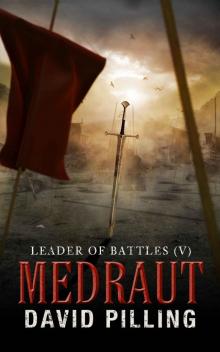 Medraut
Medraut Hardway
Hardway Holy Warrior
Holy Warrior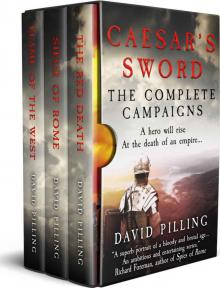 Caesar's Sword: The Complete Campaigns
Caesar's Sword: The Complete Campaigns The Wolf Cub
The Wolf Cub Reiver
Reiver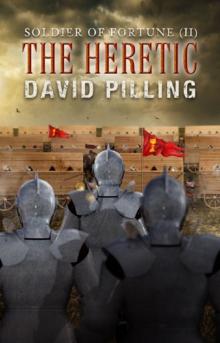 The Heretic
The Heretic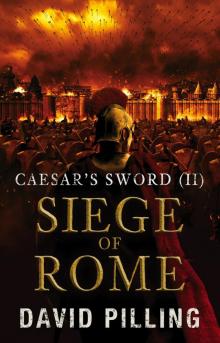 Siege of Rome
Siege of Rome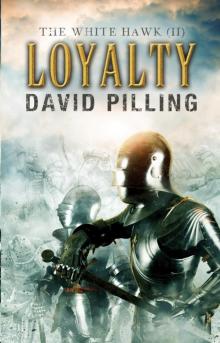 Loyalty
Loyalty The Path of Sorrow
The Path of Sorrow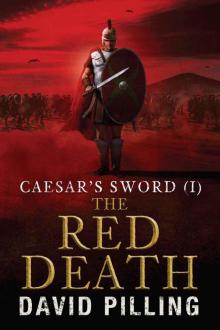 Caesar's Sword (I): The Red Death
Caesar's Sword (I): The Red Death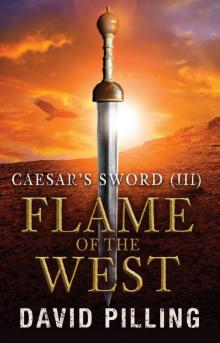 Flame of the West
Flame of the West The Best Weapon
The Best Weapon Sacrifice
Sacrifice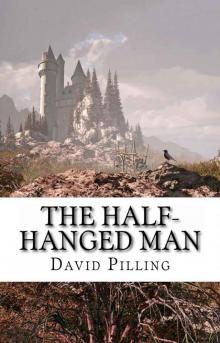 The Half-Hanged Man
The Half-Hanged Man